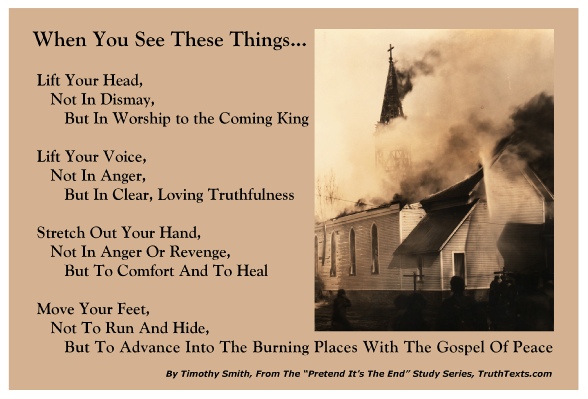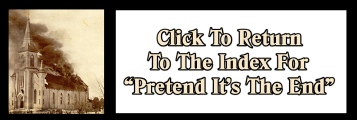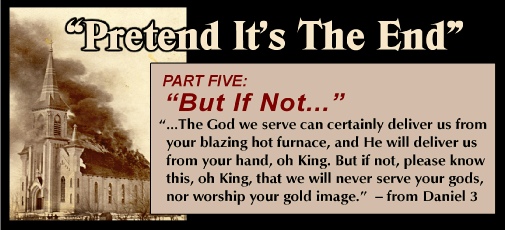Pretend It’s The End Part Five: “But If Not…” –
A Bible Study for the New and Growing Follower of Jesus
By Timothy Smith, Posted in 2022
“Pretend It’s The End” Part Five:
But If Not…
This website is hosted through Tanignak.com
TruthTexts presents a 6-
TruthTexts:
...Our God whom we serve is able to deliver us from the burning fiery furnace, and He will deliver us from your hand, O king. But if not, let it be known to you, O king, that we do not serve your gods, nor will we worship the gold image which you have set up.” (from Daniel 3, NKJV)
“I have told you all this so that you may have peace in me. Here on earth you will have many trials and sorrows. But take heart, because I have overcome the world!” (John 16:33 NLT)
Dear friends, don’t be surprised at the fiery trials you are going through, as if
something strange were happening to you. Instead, be very glad—for these trials make
you partners with Christ in his suffering, so that you will have the wonderful joy
of seeing his glory when it is revealed to all the world. (1 Peter 4:12-
“But If Not” — The Bottom Line For Persecuted Believers
All around the world, and across all generations since the earliest days of the Church, believers in Jesus have faced ridicule, have been shunned, have been persecuted, and even killed for following Him. And many times in the Bible that Jesus read, followers of God have faced those same situations. Those who stand strong sometimes experience miraculous rescues. But at other times, the way in which they go through persecution and even death becomes a powerful witness for their Faith. It is not unusual for God to use the imprisonment and even death of His people to lead others to belief.
Our study this time looks at miraculous rescues in the Bible, but also at the miraculous
results when God does not rescue. These seeming failures are often among the most
powerful witnesses for Faith found in the Bible. I call these apparent disasters
the spiritual principle of “But if Not.” Before explaining any further, here is
the original story that the phrase comes from. Judah has been conquered by Babylon,
and many Jewish captives have been taken to Babylon as slaves. Three of these captives,
faithful Jewish young men defy the mightiest emperor on earth at the time, the Babylonian
king Nebuchadnezzar. They refuse to bow down to an idol in the king’s image. Here’s
the story, from Daniel 3. The names of the three are the pagan names given by their
Babylonian masters. (Daniel 3:14,16-
Nebuchadnezzar spoke, saying to them, “Is it true, Shadrach, Meshach, and Abed-
The story concludes when the men are thrown into a blast furnace, the soldiers who threw them in are incinerated, but the three men in the fire are protected by an Angel. The men walk out of the fire unharmed, and don’t even smell like smoke. The event becomes a major witness to Nebuchadnezzar, who eventually comes to follow the God of Abraham, Isaac, and Jacob. So the principle of “But If Not” is basically this: “Our God can surely deliver us. But if not (even if He doesn’t), we won’t stray from what God has told us to do.”
The story of the “Three Hebrew Children” as they are known, has echoed across Church history, whenever persecution has struck the Followers of Jesus. But some who called themselves believers have had a different, tragic reaction to trouble. Here’s Jesus’ warning of the Last Days (Matthew 24:10 in the Amplified Bible)
At that time many will be offended and repelled [by their association with Me] and will fall away [from the One whom they should trust] and will betray one another [handing over believers to their persecutors] and will hate one another.
That is also a sad reality in the history of the followers of Jesus. So let’s be encouraged by more stories of faith!




For a bit of my personal spiritual journey, click on “Always Jesus People” below. To access the original 1999 through 2015 site with all updated photos and articles, click on “Online Articles.”




To Find Out More About Tanignak.com, Click HERE
To Visit My “About Me” Page, Click HERE
To Return to Tanignak “Home,” Click the Logo Below:



Faithful Under Great Distress: Three More Examples from the Bible
The book of Hebrews, chapter 11, lists many of the believers from the time before Jesus came to Earth, and how they suffered and died for following God. And “The Church was built on the blood of the martyrs,” as the saying goes — God’s Kingdom has grown each time a believer has loved his or her Lord more than this life. As always in this study, I am not seeking such an event, and would pray very seriously to avoid it. But I know that many will be called to make such a witness in the Last Days. Below is my version of Revelation 12:11.
The believers overcame the power of the devil through the Blood of the Lamb (the
sacrifice of Jesus on the Cross), and by the strength of their own testimony to the
life-
faced with death, knowing that Jesus had given them Eternity with Him.
In Acts chapter 4 there’s an amazing story of boldness in the Spirit during great
persecution. Read the whole thing; I’ll just touch a few highlights here. Peter and
John met a crippled man begging outside the Temple. They healed him in the name of
Jesus. The religious leaders, having only recently had Jesus crucified, were in no
mood to have more trouble on His account. Naturally, they had completely rejected
the evidence that Jesus had risen from the dead. So they arrested Peter and John
and hauled them (along with the healed man!) before their religious court. We pick
up the story in Acts 4:14-
When the religious leaders saw the courage of Peter and John and realized that they
were unschooled, ordinary men, they were astonished and they took note that these
men had been with Jesus. But since they could see the man who had been healed
standing there with them, there was nothing they could say. So they told them to
step outside while the counsel debated their fate. “What are we going to do with
these men?” they asked. “Everyone living in Jerusalem knows they have performed
a notable sign, and we cannot deny it. But to stop this thing from spreading any
further among the people, we must warn them to speak no longer to anyone in
this name.” So the counsel called them in again and commanded them not to speak
or teach at all in the name of Jesus. But Peter and John replied, “Which is right in
God’s eyes: to listen to you, or to Him? You be the judges! s for us, we cannot
help speaking about what we have seen and heard.”
Then Peter, John, and the healed man were released. When they rejoined the believers,
a mighty prayer meeting broke out. Here’s their prayer, from Acts 4:23-
When the believers heard the whole story, they all lifted their voices in unity to God
and prayed, “Lord, You are God, who has made the heaven and the earth and the sea
and everything in them, and who by the mouth of Your servant David said:
‘Why did the nations rage, and the people devise vain things?
The kings of the earth came, and the rulers were assembled together
against the Lord and against His Christ.’ (Psalm 2:1-
Indeed, both Herod and Pontius Pilate, with the Gentiles and the people of Israel, were
assembled together against Your holy Son Jesus whom You have anointed, to do what
Your hand and Your counsel had foreordained to be done. Now, Lord, look on their
threats and grant that Your servants may speak Your word with great boldness, by
stretching out Your hand to heal and that signs and wonders may be performed
in the name of Your holy Son Jesus.”
Well, the whole place shook, the Holy Spirit moved in all of them, and they went out to tell everyone about Jesus with more boldness than before! Prayer is our most potent weapon when we are in personal distress, when faced with a great disaster, and we as believers are under attack. Prayer opens our hearts to the prompting of the Holy Spirit, who helps us to remember the Word of God, directs us to do His work, fills us with boldness, empowers us to keep going, and showers us with His peace. So let’s examine that prayer before we move on.
1. They started by praising God for the situation they were in.
2. They quoted Bible verses while talking to God.
3. They reminded God of what He had already done.
4. They explained to God the situation they were in.
5. They asked God to give them boldness to share the Good News of Jesus.
6. They asked God to move with mighty power in the Name of Jesus.
Please note in their prayer that they told God things that God obviously already knew. In this way they were agreeing with God about their situation, reminding Him that He had moved in the past, and agreeing with God to witness boldly by His power. No wonder the place shook!
A few chapters later, the situation for believers was even worse. Discussions in
the religious court had given way to actual physical harm being inflicted on the
believers. The first follower of Jesus to be killed for his Lord was Stephen, who
basically ran the food bank for the early community of believers living in Jerusalem.
He debated some of the religious leaders, demonstrating from Scripture that Jesus
is the Messiah and Lord. The religious leaders made up lies about him, and then whipped
up a crowd to pick up rocks and stone him to death, the preferred old-
This same Paul, who was then a great missionary for Jesus, was put in prison for
preaching. But he was freed by an earthquake that broke down the walls of the jail.
Later, he was shipwrecked while being sent to Rome for trial. He prayed for a miracle,
and everyone on that boat made it to shore alive. Here are only a few of Paul’s other
trials as a Believer: he was stoned by a rock-
We are pressed on every side by troubles, but we are not crushed. We are perplexed, but not driven to despair. We are hunted down, but never abandoned by God. We get knocked down, but we are not destroyed. Through suffering, our bodies continue to share in the death of Jesus so that the life of Jesus may also be seen in our bodies. Yes, we live under constant danger of death because we serve Jesus, so that the life of Jesus will be evident in our dying bodies.
Paul ends his comments about his struggles with a perfect conclusion to this part
of our study. Notice the confident hope Paul has in his ultimate destination! (verses
16-
(This) is why we never give up. Though our bodies are dying, our spirits are being renewed every day. For our present troubles are small and won’t last very long. Yet they produce for us a glory that vastly outweighs them and will last forever! So we don’t look at the troubles we can see now; rather, we fix our gaze on things that cannot be seen. For the things we see now will soon be gone, but the things we cannot see will last forever.
Paul knew that God was more than capable of freeing him, and keeping him from being executed. “But if not,” Paul knew that he had a secure future in heaven, thanks to the work of Jesus in his life. Everyone, things like this are essential to keep in mind should we ever face trials like these. May we “fix our gaze…on the things that last forever!”
Take Action!
First: Check my work! Be sure to look up the verses in this study in whatever translation of the Bible is the easiest for you to understand.* Read the whole section that each verse came from, and make sure that the words I have said about them are true. Once you are sure that I have given you accurate information, ask yourself the questions. Finally, ask God to show you what you should do next.
Why is the story of the three men in the furnace an important lesson for us?
Explain the attitude and actions of the three accused men in Babylon.
What is the difference between being rebellious and being obedient?
Why is the principle of “But if not...” so important for believers to
know and practice in troubled times?
What reason did Peter and John give for refusing to keep silent about Jesus?
What did you learn about prayer from the list based on Acts 4:23-
Are you surprised that they reminded God about past events and current troubles?
Paul said in the quote at the end of the study to “fix our gaze,”
not on our troubles, but on what? Why?
* I use many translations of the Bible in these articles. Any of them would serve to support the points made in the chapter. All verses with no listed translations are my own paraphrase; please check with your own favorite Bible to be sure I got the right idea.
